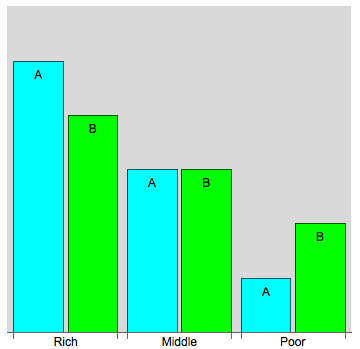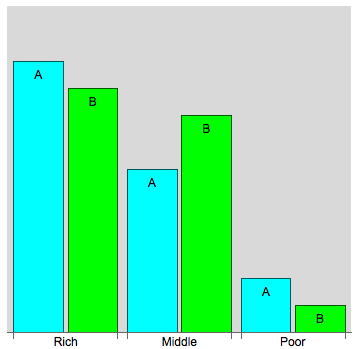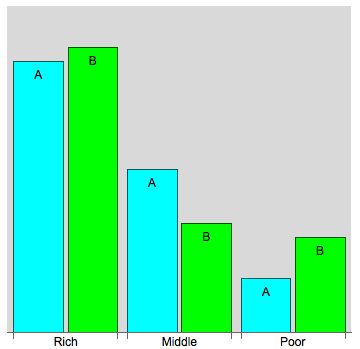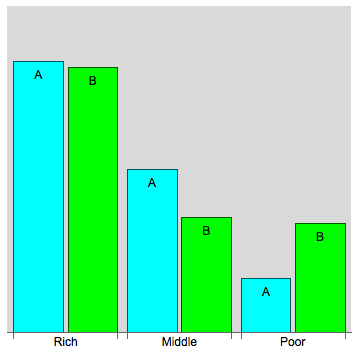Policy as Mock UN
Ezra Klein offers a response to my previous post, and there’s a lot that’s good it in. I appreciate Klein’s characteristic effort to provide a nuanced and balanced take. Nevertheless, I can’t say that I am persuaded.
Before going into the substance of Klein’s piece, I want to clarify that my prior post was not a response to the controversy that has arisen following a letter from four former CEA chairs about Gerald Friedman’s projections of the effects of Sanders’ proposals. My piece was written last Monday, the CEA letter was published Wednesday, I promise you I have no moles on Mount Olympus. I do have an opinion about the “kerfuffle” provoked by that letter, and maybe I’ll express it in a future post. (Or maybe not.) But my post on theories of politics was not addressed to that controversy.
Anyway. Klein and I agree, I think, that “in a democratic polity, wonks are the help”. Elections are where voters set the interests and values in service of which wonks’ technical expertise will later be deployed. But Klein is quite correct to point out that we don’t elect disembodied interests and values, we elect people, and the competence of those people along myriad dimensions will determine whether they are capable of translating the interests and values they represent into meaningful social outcomes. I agree with Klein that voters are called upon to evaluate not candidates’ competence, but their competences, to trade off weaknesses against strengths, and sometimes to trade off evaluations of competence against their preferences with respect to interests and values.
As Klein very aptly puts it, “debating the details of campaign proposals is, on some level, fantasy football for wonks.” But, he argues
Watching a candidate run his campaign’s policy processes is one of our best ways of predicting how he would run his White House.
The key word there, by the way, is run. Some of the most important decisions the president makes are about how to run the processes that translate vision into policy. Those decisions include whom to hire, which advisers to listen to, which ideas make sense, which strategies are likely to work. The presidency is one damn decision like that after another. Obama, famously, is so exhausted by the decision fatigue of the job that he wears the same color suit every day so he has one less thing to decide in the morning.
This is one way in which campaigns give us insight into presidencies. Presidential candidates also have to decide whom to hire, which advisers to listen to, which ideas are truly good ones, which strategies are likely to work. To make those decisions well, they need a sound philosophy, yes, but they also need to want to hear good advice, they need to want advisers who will tell them when they’re wrong, they need to have good instincts for when something they want to believe is true simply isn’t, and they need to be realistic about the strategies that are likely to work and the ones that aren’t.
A White House has to be run, for sure, and Klein is eloquent and correct on the work and care that entails. But I don’t think a campaign’s policy processes tells us anything much about that. Presidential campaigns are not presidencies. The goals, incentives, and constraints are entirely different. The “policy process” of a campaign begins first and foremost with the work of a campaign, which is to signal the interests and values of the candidate. Policy details are, for the most part, elaborated reactively, as competing candidates try to work out inconsistencies between opponents’ broad policy visions and the interests and values of the electorate they are vying to win over. Policy details are also elaborated to signal competence and to concretize interests. Detailed white papers are more than most voters are willing to work through, but their existence, especially if certified by trusted experts, may persuade voters of a candidate’s competence. One way to appeal to voters’ interests is to be able to make claims like “the typical American family will save $5200 per year if my policy is enacted”, but making that sort of claim without some pretense at a projection opens candidates to attacks on character and competence. Candidates face tradeoffs between the benefits of making speculative or ambitious claims and potential costs in perceived credibility. They also face tradeoffs between perceived benefits of making promises and the constraints those promises may impose on their future choices or credibility should they be elected. These are the factors shape the policy details they come to offer.
Certainly presidents have to sell policies to legislators, so you might argue that the sales job that is an election may not be not entirely alien to the process of governing. Mostly that’s wrong. What gets legislated is a function of constraints imposed by the legislature, and the interests that shape those constraints are very different from those of the open electorate. President Obama signaled in a State of the Union address his strong support for Universal Pre-K, as Hillary Clinton or Bernie Sanders probably both would in the context of this election. Universal Pre-K is good policy on the merits, and is popular with the public, but President Obama has made no effort whatsoever to transform his call into legislation. The skill that a President requires to get policy enacted is the ability, somehow, to get the constraints of the legislature and her own policy agenda aligned. That can be done Lyndon-Johnson-style, by backroom armtwisting; it can be done per Coase’s Theorem, with various kinds of side payments; it can be done as the prior Clinton administration did with welfare reform, by letting the administration’s agenda shift to become more hospitable to the constraints of the legislature; it can be done by creating outside threats, in terms of adverse public opinion and potential electoral risk, as Bernie Sanders proposes to do with his “political revolution”.
One certainly can draw connections between skills on display during an election and skills that will eventually be required to get policy enacted. It is not unreasonable to suggest that Hillary Clinton’s locking up of endorsements by political insiders at all levels might indicate real skill in Johnsonian arm-twisting and Coasean bargaining that will help her “get things done”. It is also not unreasonable to argue that Bernie Sanders’ remarkable success at organizing a grassroots donor and volunteer base and his clear intent (unlike President Obama) to ask those grassroots to engage publicly in conflict with political opponents, suggests a competence at creating electoral risk. Voters can and should consider these competing competencies, along with their adjudications of values and interests. But these competencies have little to do with the quality of the campaigns’ policy white papers. For the most part, wonk-quality is not a useful differentiator of presidential candidates.
Let’s look at an example. As Klein notes
There are plenty of criticisms to be made of Obama’s presidency, but I think the baseline competence of his administration has begun to dim memories of how important presidential management really is.
My own view of the Obama administration is mixed, but I am happy to second Klein here. I think the administration takes its policy process seriously, and generally does fine work along dimensions of technical competence. That doesn’t mean I endorse all of its work, or that the administration’s technical work is apolitical. It is not. All policy is ideological. Technical work carries ideology with it in how things are framed, what is assumed, and what is considered. Still, within the boundaries the Obama administration has chosen to define, its technical work is high quality.
But as Klein reminds us, eight years ago, on the core wonk controversy of 2008, Barack Obama took a position of astonishing technical incompetence. You can accuse Bernie Sanders’ campaign of touting optimistically shaded estimates or underplaying some costs, but his proposals are fundamentally sound in wonkish terms. Single-payer healthcare does work, and would eventually reduce costs, but the politics of getting there may be impossible, or we might have to tolerate a long transition period during which costs remain high to appease incumbents. What Barack Obama proposed in 2008 — universally accessible health care through individually purchased insurance without an individual mandate — was sheer absurdity. As Paul Krugman has reminded us many times, the Obamacare approach to universal insurance is a three-legged stool: guaranteed-issue leads to a death spiral without an individual mandate, and an individual mandate is unaffordable without subsidies, community rating + mandate + subsidies. (See also Ezra Klein.) If you think policy details during a campaign are the best predictor of the policy process of an administration, you would have expected very little of Barack Obama’s tenure. And you would have been wrong. I suspect that even at the time, Klein was not terrified that Obama would become his caricature of Jimmy Carter as a man whose good values were eclipsed by bad management. Obama signaled competence in ways that Klein could recognize, despite the fact that he took a ridiculous position on the core technocratic issue of the campaign in order to be more appealing to voters.
What I really think is going on is that humans, proles and elites both, have a wide variety of largely unconscious ways of reading candidates. Wonkishly inclined people don’t see themselves reflected in Bernie Sanders, as they did in Barack Obama and do in Hillary Clinton. For them like everyone else, that leads to skepticism and mistrust. But wonkishly inclined people tend not to leave it there. They are verbal, they regard themselves as rational, and so they rationalize. But Klein’s rationalization is, I think, not ultimately supportable. Neither the wonkishness of the candidate nor the quality of campaign white papers is a predictor of the success of a presidential administration. As Klein points out, George H. W. Bush was no wonk, but he was a good manager and in retrospect a decent president. From the perspective his supporters, Ronald Reagan was a phenomenally successful president, but he was no wonk, and I suspect his campaign white papers weren’t anything special either. Johnson, JFK, FDR, admittedly, the farther back we go, the harder it is to “measure” analogues of the contemporary wonk. But I don’t think you’ll find sustainable a theory of campaign policy details as a reliable predictor of actual policy competence. I think wonks, like other humans, have a tendency to see what they want to see, and to reach for theories that flatter their own views and that elevate their own role in the democratic process.





